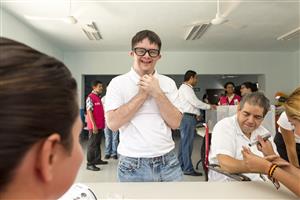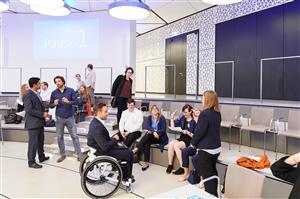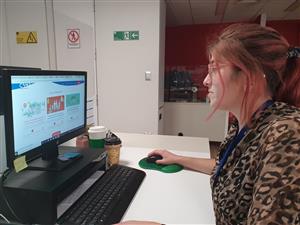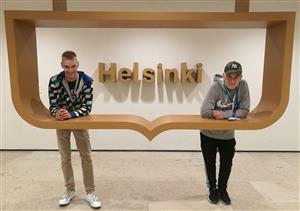Search Results
Search
Filter results
Advanced Filters
Your search returned 562 Solutions
-

New guidelines are making Mexican elections accessible
The "Protocol for the Inclusion of People with Disabilities" is a binding national protocol. It contains requirements and guidelines for the availability of Braille ballots, improved physical access for people with mobility impairments, hospital polling stations as well as the reduction of both informative and communicative barriers.
Mexican National Electoral Institute, Mexico -
Disability-led centres providing a range of services for independent living
FOH centres are run entirely by people with disabilities and aims to offer comprehensive services for such people in their home and throughout their daily lives. In 2017, 47 homes were adapted, 223 people were provided with transport, 120 people took part in sport or the arts, and 2,435 assistive devices were provided.
Forum of the Handicapped, Lebanon -

Training and placing the vulnerable in Chile
The programme supports financially particularly disadvantaged women, young people and people with disabilities on their way into the labour market through skills training, supported employment, and labour intermediation. In 2016, 5,235 people with disabilities were given the opportunity to receive training.
Chilean National Training and Employment Service, More Capable Programme of 2014-2018 National Training and Employment Service (SENCE), Ministry of Labour and Social Security, Chile, Chile -
Help for Supported Employment services providers
The "European Supported Employment Toolkit" consists of a range of Position Papers and "How To" guides and has been designed to increase the knowledge and skills of professionals responsible for the delivery of Supported Employment Services. It was written by practitioners for practitioners in an inclusive and informed manner.
European Union of Supported Employment, Help for Supported Employment services providers, Belgium -
Making microfinance inclusive
Creer is a loan product designed to reach persons with disabilities. Technically the product is the same as a standard microcredit product. After its start-up in April 2010, the product in 2013 had around 400 clients, which is considerably above industry average, while the portfolio at risk is only slightly above the average.
Banco D-Miro, Making microfinance inclusive, Ecuador -
A scalable assistive technology initiative
The F123 Initiative leverages investments made by thousands of individuals, companies, and governments in free and open-source technologies to make internships, and consequently employment opportunities, that are available in small companies accessible to persons with disabilities.
UNICEF New York, A scalable assistive technology initiative, Brazil -

Job-matching based on coaching for students with disabilities and company-partnering
The participating talents receive coaching and make contact with interested companies. Companies gain know-how in the field of inclusion and employment of people with disabilities. Since the start of the programme in 2016, 130 students and 45 companies have completed the self-financed programmes.
myAbility Social Enterprise GmbH, myAbility Talent® Programme, Austria -

Bilingual Classes Supporting Families to Learn Sign Language Together
Using a team of one person who is deaf and one who can hear, kinderhände offers bilingual classes in German and ÖGS to children aged six months to 14 years and their families. It also has an online platform for families to use at home, and has developed teacher-training modules to support ÖGS use in schools.
kinderhaende e.V., Austria -

Online accessibility training for civil servants
SENADIS, the National Disability Service of Chile, launched an online accessibility training programme for civil servants, called Preparados para Incluir, that offered three courses centred around accessibility, its legal framework, general principles, and access to ICT.
SENADIS - National Service for the Disabled Chile, Preparados para Incluir (Ready to Include), Chile -

Municipality-funded work coaches for people with disabilities
The service provides individual work coaching for people with disabilities. It is free of charge and aims to find full or part-time employment for its users. The programme has had between 240 and 273 users per year for the last three years. The number of those who found a job increased to 342 in 2019.
City of Helsinki, Supported Employment Service, Finland
- Page 1
- Page 2
- Page 3
- Page 4
- Page 5
- Page 6
- Page 7
- Page 8
- Page 9
- Page 10
- Page 11
- Page 12
- Page 13
- Page 14
- Page 15
- Page 16
- Page 17
- Page 18
- Page 19
- Page 20
- Page 21
- Page 22
- Page 23
- Page 24
- Page 25
- Page 26
- Page 27
- Page 28
- Page 29
- Page 30
- Page 31
- Page 32
- Page 33
- Page 34
- Page 35
- Page 36
- Page 37
- Page 38
- Page 39
- Page 40
- Page 41
- Page 42
- Page 43
- Page 44
- Page 45
- Page 46
- Page 47
- Page 48
- Page 49
- Page 50
- Page 51
- Page 52
- Page 53
- Page 54
- Page 55
- Page 56
- Page 57